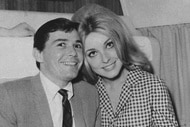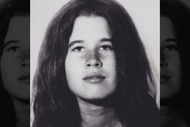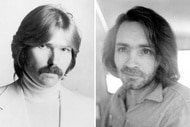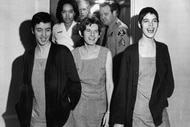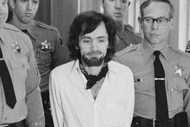How One Backpacker's Harrowing Hitchhiking Experience Led To Australia's Most Notorious Serial Killer
Paul Onions was hitchhiking to a fruit picking job in southern Australia when he had a near-deadly encounter with a man named Bill. Three years later, he provided the crucial information that took down Australia's "Backpacker Murderer," Ivan Milat.

"Australia seemed the one last place, I thought, on Earth where there was plenty of adventure left," British Navy veteran Paul Onions told the Australian news program "60 Minutes" of his decision to head Down Under in 1990. "Give me a chance to relax after being in the Navy, get a job, see plenty of sunshine, have a good look around."
So the 24-year-old air conditioning mechanic from the working-class city of Birmingham quit his job, filled a backpack and flew to Sydney. He stayed in a hostel for a bit, then took a train to the outskirts of the city on Jan. 25, intending to hitchhike down the Hume Highway to Mildura — nearly 625 miles west — to find work picking fruit, The Guardian reported.
Onions had just finished purchasing a drink at a store along the route when a passerby (whom he thought looked like famous Australian cricket player Dennis Lillee) apparently took note of his backpack and offered him a ride. He accepted a ride from the man, who introduced himself as Bill — but whose real name was Ivan Milat.
The ride got awkward fairly quickly.
"He became a bit anti-racial to the immigrants who were living in Australia," Onions told the news program. "I was so happy to get the ride and then, all of a sudden, I thought, 'Oh, no, first go, I got the nutter."
Soon, "Bill" began asking questions about Onions, the Guardian reported: "Did anyone know where he was headed? Was anyone waiting for him in Canberra? Had he done any special forces training in the Navy?"
Then, about 60 miles from where Onions got picked up, near the Belanglo State Forest, he noticed "Bill" slowing down and checking the rearview mirror. When he asked what the problem was, the driver said they were losing radio signal and he was going to pull over to grab some cassette tapes from under his seat.
"It just seemed odd, because there was actually cassettes in between us," Onions told "60 Minutes."
Feeling nervous, Onions got out when "Bill" did, only for his driver to ask what he was doing. So he hopped back in and put on his seatbelt, feeling momentarily relief when "Bill" did the same.
That relief faded when "Bill" hopped back out, pulled a handgun out from under the seat and pointed it at him.
"Obviously, all the questions were answered in one moment," Onions said in his interview. "Then the next minute, he just pulled this rope out from under the seat. And when I'd seen the rope, that just scared me more than the gun. As soon as I'd seen the rope, I just thought, 'Oh, that's going to be it. He's going to take a bit of time, he's going to do whatever he wants.'"
Onions unbuckled his seatbelt and ran onto the busy Hume Highway, trying to flag down a car. But even while being chased by a man with a gun shouting, "Stop or else I'll shoot," no one stopped to help. The driver even shot once, but missed Onions, and still no one stopped. The driver caught up with him and the two began wrestling in the middle of the highway as cars swerved around them.
"I was just about to give up and say, 'Oh, he's won, he's won, I'd better give up and go back,' and I thought, 'If I go back there ...' it just seemed that was the end if I go back there, and I just sort of made my mind up what I was going to do," Onions said. "I thought, 'The next vehicle that comes over the hill, I'm just going to stop it no matter what.'"
No matter what, to Onions in that moment, meant allowing the next car to potentially run him down.
"I thought I'd rather stop a car and get killed then go back to that vehicle and face the end that way," he added.
Luckily Joanne Berry — who had left nearby Mittagong less than half an hour earlier and was driving toward the Belanglo State Forest in a van with her sister and their five kids — stopped, having seen Onions run away from a man trying to wrestle him to the ground.
"'Help me, he's got a gun!'" Berry recalled Onions saying to her, in an interview with 7NEWS Australia in 2019. "Panic, absolutely panic. He was shaking, absolutely petrified," she told "60 Minutes."
He opened the sliding door and dove in. Berry, seeing the other man's gun, quickly put the van in reverse, backed up, turned around and headed back in the direction she and her family had started from.
"As she pulled away, I just looked back and had one quick last glance," Onions said. He thought the "Bill" was smirking.
She took Onions — who obviously left his backpack, containing his passport and other personal effects in "Bill's" car — to the nearest police station, which was 13 miles away in Bowral. Both filed a report with the police, who said without the license plate or the man's last name, they were unlikely to catch the man they believed to be a mugger. Onions said they gave him the equivalent of $7 to get back to the British embassy in Sydney to help him get a new passport, according to the BBC.
Onions' and Berry's reports lay untouched in the station's files for nearly four years, during which time a number of backpackers' bodies were recovered in the Belanglo State Force.
The first body in the forest was discovered by runners on Sept. 19, 1992, more than two-and-a-half years after Onions filed his report. Police investigating the first body found another one about 100 feet away. They were identified as British backpackers Caroline Clarke, 21, and Joanne Walters, 22, who had gone missing while hitchhiking from Sydney to western Australia on April 19, 1992.
Walters, police determined, had been gagged, sexually assaulted and stabbed 14 times in the back and chest. One of the nine stab wounds in her back severed her spinal cord, paralyzing her before the fatal stab wounds to her chest, according to NewsCorp Australia. Clark, police believed, had been marched away from her friend's body and killed with 10 shots to the back of the head, as though she'd been used for target practice.
The discovery of the bodies made the paper back in Birmingham, England, to which Onions had returned after his Australia adventure. A map accompanying the article Onions read identified the nearest town to the bodies as Bowral — where he'd reported his attempted murder.
No one had contacted him.
In October 1993, a man foraging for firewood in the forest came upon more human remains, which were ultimately identified as Australian hitchhikers Deborah Everist, 19, and James Gibson, 19, who had gone missing from Sydney on Dec. 29, 1989 while hitchhiking to ConFest — a Burning Man-type festival — in Albury, which is along the Hume Highway. Separate passersby found Gibson's camera and his backpack along a road north of Sydney in the weeks that followed, but nothing else for nearly four years.
Gibson's body was found in the fetal position, and he, too, had been stabbed multiple times in the back — including a stab wound to the back of his neck which severed his spinal cord — before meeting his end via stab wounds to his heart, lungs and liver. Everist had been beaten to death, and was found with two severe skull fractures and a broken jaw.
Australian authorities set up a task force on Oct. 13, 1993, worried they had a serial killer on their hands.
RELATED: Victims Of California Ballroom Dance Club Shooting Remembered
On Nov. 1, 1993, police searching the forest found the body of Simone Schmidl, 21, a German tourist who had disappeared while hitchhiking from Sydney to Melbourne along the Hume Highway on Jan. 20, 1991 — almost a year after Onions had reported his attempted murder. She had also been stabbed through the spine, causing paralysis, before multiple other stab wounds to her organs killed her. Police found clothing at the scene that wasn't hers.
Police found two more bodies nearby on Nov. 4, and identified them as missing German backpackers Gabor Neugebauer, 21, and Anja Habschied, 20. They had disappeared after leaving Sydney on Dec. 26, 1991 to hitchhike along the Hume Highway to western Australia. The clothing found with Schmidl's body belonged to Habschied; she was decapitated, but authorities never found her skull. Neugebauer was shot six times in the back of the head and possibly strangled.
On Nov. 5, Australian authorities made international news by offering 500,000 Australian dollars for information leading to a serial killer targeting hitchhikers departing Sydney and dumping their bodies outside of Bowral.
Four days later, Joanne Berry, who'd rescued Paul Onions, called police to say that she'd rescued a hitchhiker in January 1990 from a man with a gun near the forest, and reported it to the police in Bowral, the Sydney Morning Herald reported. Onions called the hotline on Nov. 13 and told his story directly.
Police never found any investigative report made of the incident, the paper reported, save a single entry in a notebook of the officer who took the report.
But Ivan Milat was already on their radar, as he had a criminal history and had been working doing road construction and repair in the areas where the various hitchhikers had disappeared. And, another backpacker — an Australian woman named Mary — had called the police hotline to report that a man matching Ivan Milat's description had attempted to abduct her and a friend in Bowral in 1977. Further investigation showed that Milat had been charged with, but not convicted of, the abduction and rape of two other female backpackers in 1971.
Onions was flown to Australia on May 2, 1994, and he identified Milat as the man who had attempted to kill him in 1990 from a photographic line-up. It was the strongest evidence tying Milat to the crimes at the time.
Milat was arrested on May 22, 1994. A wide variety of items belonging to the seven known victims were found during a search of his home.
He was convicted of the seven murders and of Onion's attempted abduction in July 1996 after an 18-week trial in which Milat, who testified in his own defense, attempted to pin the murders on one of his brothers. He was sentenced to seven consecutive life sentences without the possibility of parole, plus six years for his attempted abduction and robbery of Onions.
After he attempted to escape in his first year behind bars, Milat was transferred to a maximum security prison, where he unsuccessfully sought multiple appeals and engaged in repeated acts of self-harm — including swallowing razor blades and cutting off one of his own fingers — in order to either hasten his appeals or get the prison to grant various requests. In one 2001 incident, Milat went on a nine-day hunger strike to try to get prison officials to give him a PlayStation.
He never admitted his guilt in the seven murders for which he was convicted or the three other murders in which he was strongly suspected. He died in prison of esophageal cancer in 2019 at the age of 74.





